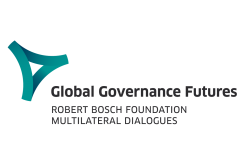Our Global Future Will Require Inclusive Ideas

Joel Sandhu introduces the Global Governance Futures 2030 – Robert Bosch Foundation Multilateral Dialogues and outlines its approach.
Thanks to rapid advances in technology, transportation, and communication networks, our world is more connected than ever before. Yet, the global political climate has never been more volatile in the post-Cold War era. The speed of technological change is one important reason for this development; the rise of non-Western powers like Brazil, China, India, Russia, and South Africa (the BRICS countries) is another key driver of this fragmentation. Faith and confidence in liberal democracy, Western-led institutions, and the free market economy have eroded over the past decade. As their global economic influence grows, non-Western powers will play an increasingly active role in shaping global institutions and rules. This comes at a time when President Trump’s decision to withdraw from the Paris climate accord is the most concrete sign yet of American reluctance to underwrite the global order. Meanwhile, relatively young regional organizations like the Shanghai Cooperation Organization, the Asian Infrastructure Investment Bank, the New Development Bank, or China’s Belt and Road Initiative are already stepping into the void to offer alternatives to Western-style economic growth and infrastructure development. Non-Western powers offer their own understandings of norms such as intervention, human rights, sovereignty, and self-determination, and they market them with growing self-confidence.
From this vantage point, finding a way forward on transboundary issues will be anything but straightforward. International cooperation is still key to tackling global challenges like climate change or migration, but it is unrealistic to assume that the post-1945, Western-dominated institutions will be enough to respond to these issues, at least in their present shape. Decision-makers and policy planners in developed and developing countries need to better understand each other’s insecurities and vulnerabilities as well as the ambitions that drive different governments and non-state actors. This requires investments in global platforms that can facilitate quality interaction and debates on contested issues. The current stalemate in many ‘old’ institutions also makes the case for experimentation with new formats across a larger set of countries and sectors.
The Global Governance Futures Approach
This starts with a dynamic process of engagement and debate between participants of diverse professional and country backgrounds. Such a platform needs to harness the participants’ collective energy to work beyond codified knowledge and combine alternative assumptions about societal change at many levels including economic, sociopolitical, and technological developments.
The Global Governance Futures – Robert Bosch Foundation Multilateral Dialogues (GGF) fellowship program offers one such platform to young professionals who want to play an active role in thinking about and shaping tomorrow. Now entering its fifth round, the GGF program brings together 27 exceptional individuals—three each from Brazil, China, France, Germany, India, Indonesia, Japan, South Africa, and the Unites States—to look ahead to and imagine possible futures for the year 2030. To do so, they apply the technique of scenario planning to governance challenges that span countries and sectors. The GGF method allows our fellows to engage in a joint experiment: How will individuals from different countries, cultural backgrounds and disciplines, who may not only hold a variety of professions but fundamentally different values, interpret topics of global relevance? Will they lock horns or join forces and reach conclusions?
At GGF, we believe that investing time and energy to understand competing interests and values is a crucial first step in building crisis resilience and better options for answering global challenges across countries and sectors. In a fast-moving and multipolar world, international organizations will continue to be slow to adapt and react to crises, let alone come up with creative responses. To compensate for that and be better equipped to deal with increasingly complex challenges, policymakers must move beyond a static approach to strategic planning—that is, an approach that assumes fixed environments and considers only the most probable future. Failure to do so will leave agencies and institutions unable to maneuver rapid changes in any given environment. As part of the GGF method, we challenge our fellows to integrate scenarios into their thought processes about global issues, which allows them to explore multiple potential futures at once, generate early warning signs, and produce new and more dynamic ways of coping with uncertainty.
The GGF program provides an intellectual and intercultural communication framework for our fellows to engage with one another as well as with the leading lights from academia, business, politics, international organizations, and non-governmental organizations. Over the course of 2018 and 2019, all 27 fellows will come together for a series of meetings held in five countries to seek new ways of addressing transboundary challenges through global public policy. For this next round, GGF2030, they will focus on three key issues: the potential futures of global order, global migration and refugee challenges, and the role cities will come to play in global governance in the world of 2030 and beyond.
Through facilitated working group sessions, our fellows will explore different views and understandings of the GGF 2030 topics. They will engage in structured discussions, intense yet respectful debates, and zoom in on divergent normative convictions about the shape and role of global governance. Doing so, they will draw on the knowledge of experts from the nine GGF countries, deliver interactive presentations, and find engaging ways to share their insights on foreign and domestic policies with the broader publics in their respective countries. The GGF process captures the unique strengths, experiences and perspectives of each fellow as they work towards a common goal.
An Inclusive Marketplace for Ideas
It is our firm belief that solutions to global challenges can only arise when different actors are able to cooperate and negotiate what are often opposing interests. The prerequisite for this is a modicum of trust. To this end, GGF fosters professional and personal relationships between young professionals from countries that are not only competitors on the global stage, but are also vastly different in terms of language, culture, political setup, and stage of economic development. Crucially, the structured dialogue approach we use creates a framework within which the fellows can identify—and address—the competing views that future global governance mechanisms will have to manage. Even more importantly, they will carry these insights beyond the program and into their decision-making as future leaders in their respective countries and professions.
We will be using the GGF analysis page and the Global Policy Journal to publish op-eds, interviews and podcasts produced by or with our fellows. In addition, the GGF 2030 fellows will author scenario reports outlining possible developments in their respective issue areas for the next decade. Based on these scenarios, they will identify and prioritize both opportunities and threats, and contextualize their policy ideas for specific actors and institutions to push for positive outcomes.
One thing is clear: in our highly connected world, individual countries cannot retreat into their own bubbles and wish away the threats that face all of us as a global community. Challenges that transcend boundaries require innovative solutions from a marketplace of ideas that reflects the globalized world. We need to find new ways of working together globally. The Global Governance Futures program and our fellows stand ready to contribute to this effort.
Joel Sandhu is a project manager with the Global Public Policy Institute (GPPi) in Berlin, where he heads the Global Governance Futures – Robert Bosch Foundation Multilateral Dialogues.


